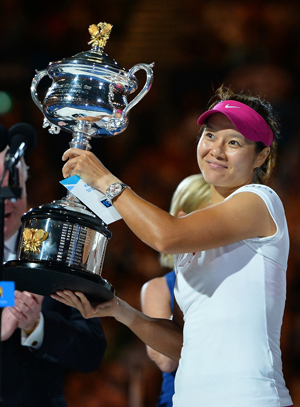
Li Na won her second major title at the 2014 Australian Open (Photo by AFP ImageForum)
By Jason J. Cruz
Northwest Asian Weekly
Li Na is not your typical female tennis player. Her performance on the court and her talk off it are what makes her one of the most influential persons in the sport.
Li was voted one of Time magazine’s 100 most influential people in the world. She is also on the Forbes list as one of the highest paid athletes in sports. Li is the first Chinese-born player to crack the world’s top five women’s tennis players in the world. She was also named one of the top 10 influential athletes in China.
Upon winning the second Grand Slam of her career at the Australian Open this year, Li’s acceptance speech was something to behold. Li thanked her agent “for making me rich.” This drew the appreciation and laughter of the Aussie crowd and those Chinese fans making the trip down under. Li had more humor as she used her husband and tennis coach as a punch line.
“You are so lucky to find me,” smiled Li, which drew a loving laugh and blushing from her husband. She also thanked him for making her drinks and restringing her tennis rackets.
At 31 years old, Li is on top of women’s tennis. Off the court, she has a big portfolio of endorsements. She was correct in thanking her agent for making her rich. According to a report, her agent has secured $42 million worth of endorsements. She counts Mercedes-Benz, Nike, Rolex, and Samsung as her major endorsements, as well as several Chinese companies. Li is currently in talks with a real estate development company that may provide for her after her tennis career is over, as well as the potential for a Li Na tennis academy. Her off-the-court business makes her the third-highest paid female athlete in any sport.
Li is outspoken and funny, but some see her as a controversial figure in China. She rebelled against the centralized Chinese sports system when she lobbied for more control over her career. This included the opportunity to choose her coach, schedules, and support staff, and to retain most of her prize money. While China’s state-run media appreciates her victories in bringing fame for China, she still faces criticism for splitting with the state run sports system. She has been labeled as “selfish” and accused of not honoring her country for failing to thank China in acceptance speeches. Li barked at a reporter from China after a loss at the 2013 French Open. It was after this loss that Li said that she considered retirement due to off-the-court issues. Fortunately for Li, she remained focused on tennis and made the semifinals at the U.S. Open this past August. She then won the Australian Open last month.
Li was born in 1982 and was pushed into sports at age 6. She took up badminton, as her father was a former badminton player whose career was cut short. Li was persuaded to switch to tennis when she was 8 years old. She was not happy with her tennis coaches, but pressed on because of her father’s wishes. Li’s father died when she was 14, but she was not told for several days because she was playing in a tournament and her coach didn’t want her to know until the competition was over.
It’s possible these interactions with her coaches as a teenager likely made her more resistant to the constraints of the Chinese-run sports systems. Thus, her ability to be independent has allowed Li to play unburdened.
Despite the rocky relationship she may have with the Chinese officials and media, Li remains a popular and influential figure in her country, as well as an inspiration for many young female tennis players. (end)
Jason Cruz can be reached at info@nwasianweekly.com.




While other players pulled off upsets and cleared her draw, it’s still a well deserved win for Na, who could have easily pulled a Na and choked the championship.
She is a good ambassador for tennis in the Chinese market.
Nice writeup, Jason. 🙂